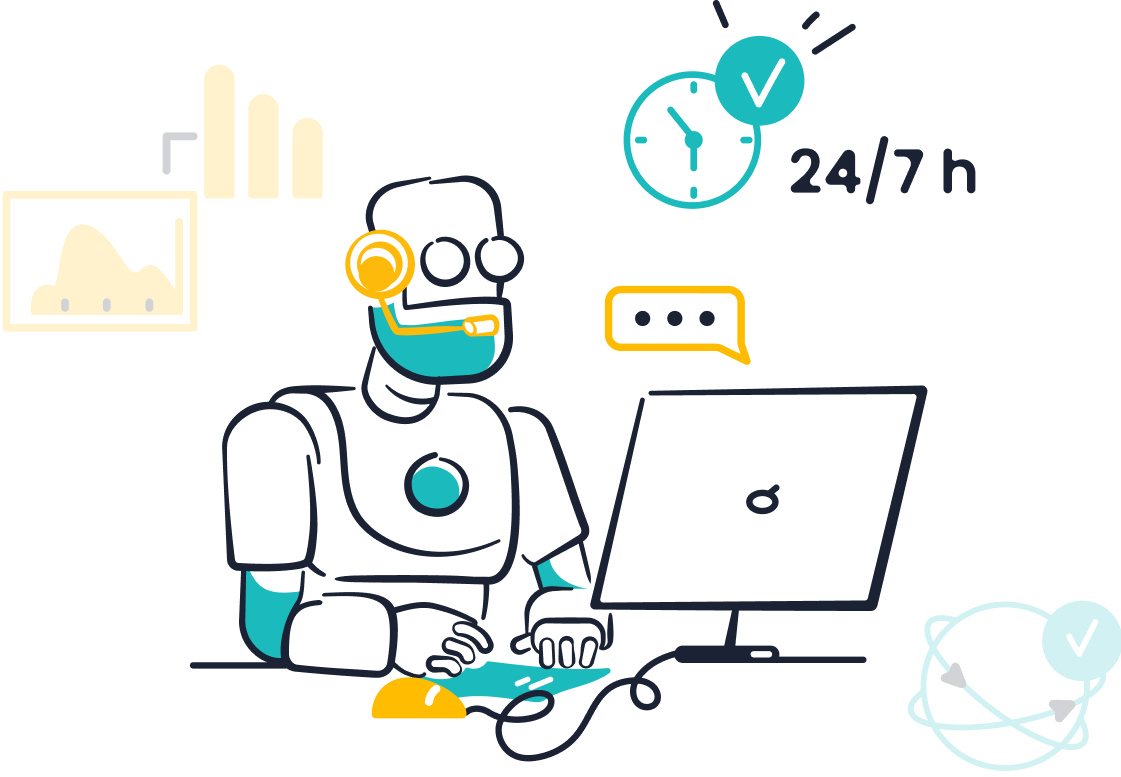Revolutionizing Customer Care with Conversational AI

Imagine a world where your customer care experience feels seamless, efficient, and personalized. Conversational AI for customer care is making this a reality by transforming how businesses interact with customers. Studies show that 80% of companies are already using AI to enhance customer service, with the market projected to reach $4.1 billion by 2027. This technology not only improves efficiency but also strengthens customer relationships.
Sobot stands at the forefront of this revolution. Its AI-powered solutions have helped brands like Samsung achieve a 97% customer satisfaction rate and reduced inbound discussions by 20% over two years. By integrating Sobot's conversational AI into your customer care strategy, you can deliver exceptional experiences while optimizing operations.
Understanding Conversational AI for Customer Care
What is Conversational AI?
Key components: Natural Language Processing (NLP) and Machine Learning (ML)
Conversational AI is a branch of artificial intelligence that enables machines to engage in human-like dialogue. It relies on two key technologies: Natural Language Processing (NLP) and Machine Learning (ML). NLP allows systems to understand and respond to human language, while ML helps these systems improve over time by learning from interactions. Together, they create seamless and logical conversations that enhance customer interactions.
For example, NLP can interpret a customer’s query about a delayed order, while ML ensures the system learns from similar past queries to provide faster and more accurate responses in the future. This combination is the backbone of conversational AI for customer care, enabling businesses to deliver efficient and personalized support.
How conversational AI enhances customer interactions
Conversational AI transforms customer service by offering instant, accurate, and 24/7 support. It reduces wait times, resolves issues faster, and provides consistent responses. According to recent data, 74% of consumers believe AI improves service efficiency, while 75% expect AI to match human-level assistance. These capabilities not only improve the customer experience but also drive loyalty and satisfaction.

Sobot's Role in Conversational AI
Overview of Sobot's AI-powered Chatbot

Sobot’s AI-powered chatbot is a game-changer in customer service. It automates routine queries, assists agents, and operates across multiple channels like WhatsApp and SMS. With its advanced chatbot capabilities, Sobot improves productivity by 70% and reduces costs by up to 50%. Its no-coding-required setup makes it accessible for businesses of all sizes.
Unique features like multilingual support and 24/7 availability
Sobot’s chatbot stands out with its multilingual support, enabling businesses to communicate with customers in their preferred language. Operating 24/7, it ensures uninterrupted service, enhancing the overall customer experience. These features make Sobot a leader in conversational AI for customer care.
Real-World Applications of Conversational AI in Customer Service

Chatbots for Instant Customer Support
Examples: E-commerce inquiries and order tracking
Chatbots have become indispensable in e-commerce. They handle inquiries about product availability, shipping updates, and order tracking with remarkable efficiency. For instance, brands like Starbucks and Sephora use conversational AI to simplify customer interactions. These chatbots provide instant responses, ensuring customers receive the information they need without delays.
In e-commerce, 62% of customers prefer chatbots over waiting for a human agent, and 61% value faster replies from AI systems. Businesses using chatbots report a 7-25% increase in revenue, demonstrating their impact on customer satisfaction and sales.
Sobot Chatbot's impact on efficiency and cost savings
Sobot's AI-powered chatbot transforms customer service by automating repetitive tasks. It operates 24/7, reducing the need for additional agents and cutting costs by up to 50%. With its multilingual capabilities, it ensures seamless communication across diverse customer bases. By improving productivity by 70%, Sobot's chatbot helps businesses deliver efficient and cost-effective support.
Voice Assistants in Call Centers
Examples: Managing high call volumes and routing calls
Voice assistants excel in managing high call volumes. They route calls to the appropriate departments, reducing the workload for human agents. Companies like Macy’s use virtual assistants to streamline customer service operations. These systems ensure quick responses, minimizing customer frustration during peak hours.
| Metric | Statistic |
|---|---|
| Average hold time | Up to 60% of customers will hang up if their hold time exceeds two minutes. |
| First Call Resolution | Good FCR reduces repeat call rates, leading to lower call volume and shorter hold times. |
Benefits: Reducing wait times and improving productivity
Virtual assistants significantly reduce wait times by addressing simple queries instantly. This allows human agents to focus on complex issues, improving overall productivity. Sobot's solutions integrate seamlessly with call centers, ensuring smooth transitions between AI and human agents for a superior customer experience.
Self-Service Tools for Enhanced Customer Experience
Examples: Knowledge bases and automated troubleshooting
Self-service tools empower customers to resolve issues independently. Knowledge bases and automated troubleshooting systems provide quick answers to common questions. For example, self-service portals resolve issues three times faster than traditional channels, and businesses see a 45% increase in customer satisfaction after implementing these tools.
| Evidence Description | Source |
|---|---|
| Self-service portals resolve customer issues three times faster than traditional channels. | ASAR Digital |
| Clients experience an average 45% increase in customer satisfaction (CSAT) after implementing self-service solutions. | Service Target |
Sobot's contribution to empowering customers
Sobot enhances customer self-service by offering AI-driven tools like its chatbot and knowledge base integration. These solutions allow customers to find answers quickly, reducing dependency on support agents. By prioritizing customer convenience, Sobot helps businesses improve satisfaction and loyalty.
Proactive Customer Engagement
Proactive customer engagement transforms how you connect with your audience. Instead of waiting for customers to reach out, you can anticipate their needs and provide timely updates, reminders, or personalized offers. This approach builds trust and strengthens relationships, ensuring your customers feel valued.
Examples: Sending reminders, updates, and personalized offers
Proactive engagement includes sending appointment reminders, shipping updates, or exclusive offers tailored to individual preferences. For instance, a retail brand might notify customers about upcoming sales or restocked items based on their purchase history. Similarly, a financial service provider could send alerts about payment deadlines or account activity. These actions demonstrate attentiveness and keep customers informed.
Sobot’s AI-powered chatbot excels in proactive engagement. It uses real-time intent analysis to identify opportunities for personalized communication. For example, it can send reminders about abandoned carts or offer discounts to encourage purchases. By automating these interactions, Sobot helps you stay connected with your customers while saving time and resources.
Benefits: Increasing customer satisfaction and loyalty
Proactive engagement delivers measurable benefits. It boosts customer satisfaction by addressing concerns before they arise and enhances loyalty by creating meaningful connections. Studies show that proactive strategies increase customer satisfaction by 20%, retention by 15%, and brand loyalty by 30%. Conversion rates also rise by 25%, as customers appreciate the personalized attention.
| Metric | Source | Percentage Increase |
|---|---|---|
| Customer Satisfaction | Gartner | 20% |
| Customer Retention | Forrester | 15% |
| Brand Loyalty | Harvard Business Review | 30% |
| Conversion Rates | HubSpot | 25% |

Sobot’s solutions amplify these benefits. Its chatbot engages customers proactively, ensuring they receive timely updates and personalized offers. This approach not only improves satisfaction but also fosters long-term loyalty, helping your business thrive in a competitive market.
Benefits of Conversational AI in Customer Support
Cost Savings and Operational Efficiency
Reducing the need for large support teams
Conversational AI reduces the need for large customer support teams by automating repetitive tasks. Chatbots handle common queries like order tracking or FAQs, freeing up human agents for more complex issues. This efficiency allows businesses to scale operations without increasing staff. For example, AI operates 24/7, eliminating the need for additional shifts or overtime pay. Real-time analysis of customer interactions also provides insights that help optimize workflows and reduce operational costs.
Sobot Chatbot's role in cutting expenses by 50%
Sobot's AI-powered chatbot significantly lowers expenses for businesses. It automates up to 70% of customer interactions, reducing the need for additional agents. Small businesses save up to 30%, while mid-sized companies cut costs by 50%. Large enterprises see savings of up to 70%, translating to millions annually.
| Company Size | Cost Reduction Percentage | Annual Savings Range |
|---|---|---|
| Small Businesses | Up to 30% | $50K - $100K |
| Mid-sized Companies | Up to 50% | $200K - $500K |
| Large Enterprises | 60-70% | $1M - $5M |
Improved Customer Experience
Providing 24/7 availability and instant responses
Conversational AI ensures your customers receive support anytime, anywhere. Chatbots provide instant responses, reducing wait times and improving satisfaction. Studies show 61% of consumers prefer faster replies from AI over waiting for human representatives. Sobot's chatbot operates round-the-clock, offering personalized responses that enhance the customer experience.
Delivering personalized and consistent interactions
AI in customer service excels at delivering consistent and personalized experiences. Chatbots analyze customer data to tailor responses, ensuring every interaction feels unique. For instance, Sobot's chatbot uses real-time intent analysis to provide accurate answers, boosting customer satisfaction. This level of personalization builds trust and loyalty, key components of effective customer experience management.
| Statistic | Description |
|---|---|
| 61% | Consumers prefer faster replies from AI over waiting for human representatives. |
| 75% | U.S. business owners reported AI improved customer experience through instant messaging. |

Enhanced Productivity and Workflow Optimization
Freeing up agents for complex tasks
Chatbots handle routine queries, allowing agents to focus on complex customer interactions. This improves productivity and ensures high-quality care for critical issues. For example, Lear Capital used conversational AI to reduce its sales team by four representatives, saving $45,000 annually per rep. This shift allowed the company to engage more leads and improve marketing efficiency.
Streamlining processes with AI-driven tools
Conversational AI streamlines workflows by automating processes like ticket routing and data collection. Sobot's chatbot integrates seamlessly with CRM systems, ensuring smooth transitions between AI and human agents. Self-service resolution rates increase, and businesses experience faster issue resolution. These tools not only enhance productivity but also improve customer satisfaction.
- Cost savings with AI: Businesses save on labor costs by automating customer inquiries.
- Self-service resolution rate: Customers resolve issues independently, reducing agent workload.
- Positive feedback share: AI interactions lead to higher satisfaction rates.
Best Practices for Implementing Conversational AI in Customer Care
Ensuring Data Security and Privacy
Adhering to compliance standards and regulations
When implementing conversational AI, you must prioritize compliance with established regulations. Frameworks like the National AI Initiative Act of 2020 and the White House Blueprint for an AI Bill of Rights provide guidelines for ethical AI use. These standards ensure fairness, transparency, and safety in AI systems. For example, the Federal Trade Commission (FTC) actively monitors AI applications to prevent discriminatory practices. By adhering to these regulations, you can build trust with your customers and protect your business from legal risks.
| Regulatory Framework | Description |
|---|---|
| National AI Initiative Act of 2020 | Established a national strategy for AI development and use. |
| White House Blueprint for AI Bill of Rights | Offers principles for equitable and safe AI system implementation. |
| FTC's Regulatory Actions | Enforces actions against unethical AI practices, ensuring accountability. |
Protecting sensitive customer information
Data security is critical when automating customer service. AI systems handle sensitive information like payment details and personal data. You should implement encryption, access controls, and regular audits to safeguard this information. Sobot’s AI customer support solutions prioritize security by adhering to strict data protection protocols. This ensures that your customers’ trust remains intact while you leverage AI tools to enhance service efficiency.
Seamless Integration with Existing Systems
Connecting AI tools with CRM and other platforms
Integrating conversational AI with your existing systems ensures a smooth workflow. AI-powered CRM tools automate repetitive tasks, allowing your team to focus on strategic activities. For instance, generative AI can suggest optimal customer engagement strategies, improving targeting and profitability. Real-time support from AI agents also enhances decision-making by analyzing data quickly. These integrations streamline operations and improve customer satisfaction.
- Automation in AI-powered CRM systems boosts efficiency.
- Personalized email campaigns and dynamic pricing models improve profitability.
- AI-driven insights lead to better targeting and higher ROI.
Sobot's approach to smooth transitions between AI and human agents
Sobot excels in creating seamless transitions between AI and human agents. Its AI customer service tools integrate with CRM platforms, ensuring consistent communication. For example, Sobot’s chatbot analyzes customer queries and escalates complex issues to human agents when needed. This approach enhances operational efficiency and ensures a superior customer experience.
Continuous Training and Optimization
Regularly updating AI models for accuracy
AI systems require regular updates to stay effective. Continuous monitoring ensures that models adapt to changing customer behaviors. For example, retraining AI with new data improves its ability to handle evolving queries. Sobot’s conversational AI solutions undergo periodic updates to maintain high accuracy and relevance, ensuring your business stays ahead of customer needs.
Monitoring performance and gathering customer feedback
Tracking performance metrics like resolution rates and response times helps you identify areas for improvement. Customer feedback provides valuable insights into how well your AI tools are performing. Sobot’s AI customer support solutions include robust reporting features, enabling you to monitor and optimize performance effectively. This iterative process ensures your AI tools deliver consistent value over time.
The Future of Conversational AI in Customer Service

Emerging Trends and Innovations
AI-powered sentiment analysis and emotional intelligence
Conversational AI is evolving to understand not just what customers say but how they feel. AI-powered sentiment analysis uses natural language processing to detect emotions in text or speech. For example, it can identify frustration in a customer’s tone and escalate the issue to a human agent. This emotional intelligence allows businesses to respond with empathy, improving the overall customer experience.
Dialogue management systems further enhance this capability by maintaining context throughout conversations. This ensures smoother interactions, even when customers switch topics. As conversational AI becomes more emotionally aware, it will redefine how you connect with your audience, making every interaction more meaningful.
| Key Aspect | Description |
|---|---|
| Natural Language Processing | Enables machines to understand and create human language, crucial for sentiment analysis. |
| Dialogue Management | Manages conversation flow, understanding context, which enhances customer interactions. |
Advanced personalization through predictive analytics
Predictive analytics is transforming conversational AI into a proactive tool. By analyzing past interactions, it predicts customer needs and tailors responses accordingly. For instance, if a customer frequently asks about product restocks, the system can proactively notify them when items become available.
This level of personalization enhances the customer experience by making interactions feel tailored and relevant. Sobot’s chatbot leverages predictive analytics to send personalized offers or reminders, boosting engagement and satisfaction. As this technology advances, it will help you anticipate customer needs, creating a seamless and proactive service experience.
| Key Aspect | Description |
|---|---|
| Predictive Analysis | Uses data to identify patterns and predict future behaviors, supporting proactive customer engagement. |
Long-term Impact on Customer Support
Shaping the future of customer-agent interactions
Conversational AI is reshaping how you interact with customers. By automating routine tasks, it frees human agents to focus on complex issues. This collaboration creates a balanced approach, combining AI’s efficiency with human empathy.
For example, Sobot’s chatbot handles repetitive queries, allowing agents to dedicate more time to personalized support. This synergy not only improves productivity but also ensures a superior customer experience. As AI continues to evolve, it will redefine the roles of agents, making them more strategic and impactful.
Driving customer loyalty and business growth
The integration of conversational AI drives long-term benefits for your business. It enhances customer satisfaction by providing instant, accurate, and personalized support. Studies show that 97% of executives believe conversational AI positively impacts user satisfaction.
Additionally, the market for conversational AI is projected to reach $32 billion by 2030, growing at 19% annually. This growth reflects its potential to reduce costs and increase efficiency. Sobot’s solutions exemplify this impact by helping businesses save up to 50% on operational costs while boosting customer loyalty. By adopting conversational AI, you position your business for sustained growth and success.
- By 2030, the market value of conversational AI is expected to reach $32 billion, with a 19% annual growth rate since 2021.
- Predictions for 2025 suggest that digital assistants could reduce client service costs by as much as $11 billion.
| Statistic | Description |
|---|---|
| 63% | Executives planning to enhance or introduce consumer-facing AI in the coming year. |
| 52% | Organizations currently investing in conversational AI technologies. |
| 97% | Executives acknowledging positive influence of Conversational AI on user satisfaction. |
Conversational AI has revolutionized customer service by automating interactions, reducing costs, and enhancing satisfaction. Studies reveal that 80% of companies use AI to improve experiences, while 64% believe it strengthens customer relationships. Businesses also report a 47% increase in average order value due to AI-driven solutions.
Sobot exemplifies this transformation. Its AI-powered chatbot delivers 24/7 multilingual support, resolving 85% of issues and achieving a 97% customer satisfaction rate. By adopting best practices like seamless integration and regular optimization, you can maximize these benefits.
The future of conversational AI promises even greater advancements. Innovations like sentiment analysis and predictive analytics will redefine customer engagement, driving loyalty and growth. Embracing this technology positions your business for long-term success.

FAQ
What is conversational AI, and how does it work?
Conversational AI uses technologies like Natural Language Processing (NLP) and Machine Learning (ML) to enable machines to understand and respond to human language. It powers tools like chatbots and voice assistants, automating customer interactions. For example, Sobot’s chatbot uses conversational AI to provide instant, accurate, and multilingual support.
How can Sobot's chatbot improve customer care?
Sobot’s chatbot automates repetitive tasks, reducing agent workload by 70%. It operates 24/7, ensuring customers receive instant responses. Its multilingual support allows businesses to connect with global audiences. These features enhance efficiency, cut costs by 50%, and improve customer satisfaction.
Is conversational AI secure for handling customer data?
Yes, conversational AI systems like Sobot’s prioritize data security. They use encryption, access controls, and regular audits to protect sensitive information. By adhering to strict compliance standards, Sobot ensures your customer data remains safe and secure.
Can conversational AI replace human agents entirely?
Conversational AI complements human agents rather than replacing them. It handles routine queries, allowing agents to focus on complex issues. For instance, Sobot’s chatbot resolves 85% of inquiries, leaving agents free to provide personalized support. This balance improves productivity and customer experience.
How does Sobot's chatbot integrate with existing systems?
Sobot’s chatbot integrates seamlessly with CRM platforms and other tools. It ensures smooth transitions between AI and human agents. For example, it analyzes customer queries and escalates complex issues to agents when needed. This integration streamlines workflows and enhances service quality.
See Also
Transforming Customer Support With AI Service Agents
Evaluating AI Solutions For Enterprise Call Centers
Enhancing E-commerce Customer Satisfaction Through Chatbots